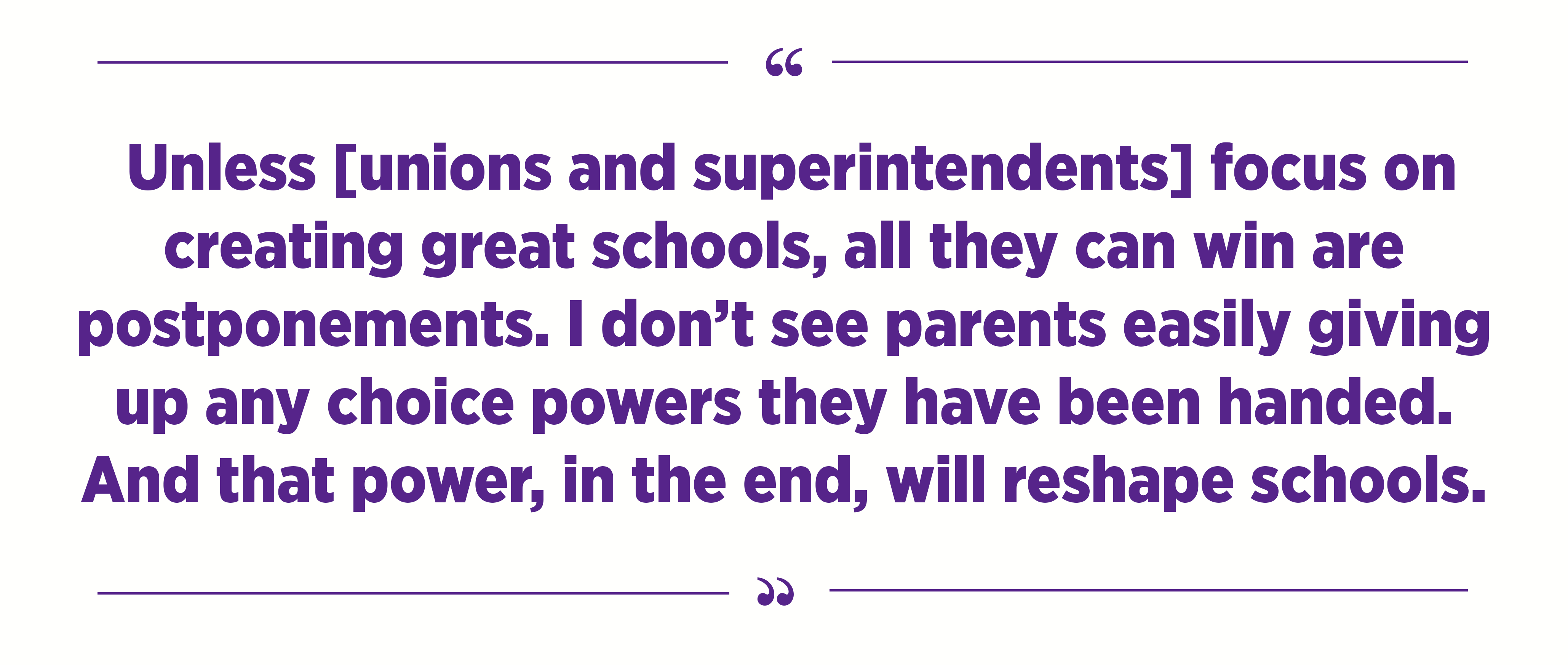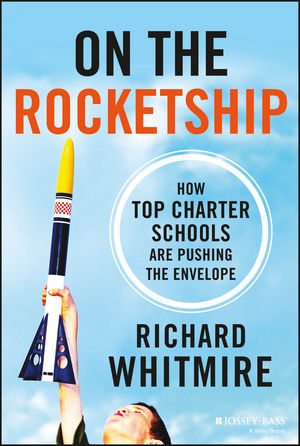
Richard Whitmire on Rocketship, Parent Advocates and a Movement Towards Equity
by Kevin Bronk, Editor, Beyond
Longtime education reporter Richard Whitmire approached our co-founders Preston Smith and John Danner in 2012 to request completely open access to follow our work for twelve months. Without any editorial oversight, we agreed. As a result, he gained insight in to our schools, our approach to innovation and witnessed the launch of our first region outside of California: Milwaukee.
While Rocketship’s mission to eliminate the achievement gap in our lifetime is simple, our work to open high-performing schools in underserved communities is complex. On the Rocketship: How Top Charter Schools are Pushing the Envelope captures the nuance of our work at Rocketship and across the country, and we’re excited for Whitmire’s candid and well-written perspective to hit bookshelves in June. In anticipation for his book release, I had an opportunity to reflect on his time with us over the past two years.
KB: You’ve written about a range of issues in education. What was the impetus for writing about Rocketship?
RW: I wrote a book about Michelle Rhee’s time in D.C. (The Bee Eater) with this in mind: If Rhee can’t turn around the relatively small D.C. district with the enormous resources at her disposal, what hope is there for other troubled urban districts? When the political backlash forced her from office, I decided it was time to look beyond traditional urban school reform.
So I asked the question: What could high performing charters do? Could they grow enough to make a difference? That’s why I chose Rocketship. Its growth plans at that time were incredibly ambitious. Could they pull it off?
KB: What did you learn about Rocketship that surprised you the most?
RW: That educational technology was such a small player in its success. Blended learning is an important ingredient, but I would rank it far below Rocketship’s boldness – the willingness to come up with new ways of opening schools, and succeeding the very first year, on California’s skimpy per-pupil payments.
The biggest surprise was the prominent role that parent activism played, both at the school level and beyond, with parents playing such key roles in achieving political wins. Many charters would prefer that parents play minimal roles. Rocketship is different.
KB: From your perspective, what are the biggest opportunities with blended learning? What are the biggest challenges?
RW: I observed what every Rocketship teacher already knows: math programs work a lot better than reading programs. And I also observed that lapse in classroom culture when moving from the classroom to Learning Labs. Culture is everything to high- performing charters.
Rocketship tried to correct that during the year I was observing – maybe a little too fast. That’s how startups execute change, at warp speed. But schools serving low income kids can’t handle the turbulence and recover as easily as tech startups.
KB: You dedicate your book to the “True disruptors: Rocketship parents pressing for better middle schools and high schools.” What stands out about these parents?
RW: I was fascinated by the process that discovered a potential leader such as Karen Martinez. I recall the first time I saw her speak on a parent panel. After she spoke everyone looked at one another and asked, ‘Who was that?’ Karen is one of many parent leaders who surfaced from the PACT/Rocketship efforts.
At this point in time, we have no idea whether the academic gains arising from Rocketship schools persist through traditional middle schools, but if parent leaders can form high performing charter middle schools, and then high schools, your work will be more than justified.
KB: What do you see as the greatest differentiator between public schools and public charter schools?
RW: I thought Duncan Klussmann, the superintendent of schools in Spring Branch (part of Houston), Texas, put it best. When he visited nearby KIPP and YES Prep schools he concluded that he wanted to import two charter strengths: culture and urgency. That’s what I find missing in most traditional urban schools.
What’s interesting about Klussmann, who runs Spring Branch schools, is that he figured out a way to form a compact with those two charters that allows those strengths to seep into his schools. In return, he offers the charter students something they rarely get: a rich selection of elective courses.
 KB: What do you think is the biggest misconception about Rocketship? How about public charter schools in general?
KB: What do you think is the biggest misconception about Rocketship? How about public charter schools in general?
RW: The biggest misconception is about blended learning. I interviewed a union official in Milwaukee, one tasked with fighting Rocketship’s expansion into that city, who informed me that blended learning “de-skilled” teachers. I had never heard that term before; it still makes me laugh. Rocketship works for the same reasons other top charters work – intelligent, highly motivated teachers who embrace the culture/urgency message.
The other misconception, of course, is that charter schools are not public schools, or that they are out to “privatize” American public education. The “pushback” movement led by Diane Ravitch has been extraordinarily effective in getting that message out and making people believe it. But in the end, all that will matter is who can create great schools. The rest is just political noise.
KB: You talk a lot about Fibonacci schools in your book. Can you describe what they are?
RW: John Danner used that term during our first interview to describe his plans for rapid expansion. Not being much of a math person, I didn’t even know what it meant. But I embraced it as a term that means rapid expansion without losing quality. When it comes to charters, that’s a difficult feat to accomplish. Most charter school groups run into what might be politely called a “learning year” that sets them back. The best ones learn from their setbacks and figure out a way to keep expanding. I think Rocketship will fall into that category.
KB: Can you talk more about what you learned about teacher and school leader development? How critical is this to Fibonacci schools and what did you learn about this area from Rocketship?
RW: Rocketship is as dependent on developing top teachers and leaders as other top charters – maybe even more so at Rocketship, because you are smaller than some of the others. Rocketship goes to places such as Nashville and Dallas when it has a great school leader wanting to move there. Organizations such as KIPP, at least in DC, seem to have developed a deeper leadership bench. KIPP is held back by facilities, at least in DC. Rocketship seems to have gotten ahead of the learning curve on facilities.
As far as teachers, I know the original plan was to retain the Teach for America hires far longer than other charters. Your current rate is only slightly longer. I’m not sure that retention time is much of an indicator of anything, however. The question everyone is asking is: Does it really matter if our teachers stay on average for only 3.5 years? Maybe, maybe not.
KB: Where in the country do you see the strongest movements toward educational equity?
RW: I like what I see going on in Memphis with the Achievement School District. Everyone is hesitant to draw lessons from New Orleans (can you really count on a Katrina?), but Memphis is a place where some charters are taking over entire schools in restarts. In the book, I profile Aspire taking over Hanley Elementary. Plus, they have aggressively developed some high quality local charters, which greatly dampens the emotions we see in Newark about “outsiders” coming in. I know Rocketship is looking at a restart in Nashville. That’s impressive.
But from a broader perspective, I’m most optimistic about the model I profile in Spring Branch, where a superintendent was able to slide some top performing charters into existing schools with a great deal of cooperation. This approach minimizes the negative politics and maximizes the benefits for both the traditional schools and charters. Everyone comes out a winner. To me, this model holds the best promise for rapidly expanding the reach of top charters.

“On the Rocketship: How Top Charter Schools are Pushing the Envelope” hits bookshelves in June 2014.
KB: What role — if any — can public education play in effectively combating poverty?
RW: I think it’s fair to say that even great charters can’t overcome the impacts of severe poverty. But they can make a difference. We need new ways to measure those differences. We should set aside test scores and instead settle on more practical achievements, such as doubling the number of students who get placed into community college classes without having to take remedial courses. And then measure graduation rates from those same community colleges. You could do the same with professional certificates and four-year colleges.
KB: Looking at the current education landscape, what’s most exciting to you?
RW: I like how parents are mostly ignoring the caustic education debates. When you offer parents choice – and high-performing schools – they seek them out. The wait lists are proof of that. I see unions and superintendents coming up with effective ways to postpone change, but in the end, unless they focus on creating great schools, all they can win are postponements. I don’t see parents easily giving up any choice powers they have been handed. And that power, in the end, will reshape schools.
KB: What do you hope your readers will take away from your newest book?
RW: That it is possible – despite all the challenges and setbacks – to create great schools. And that there are ways that top charters can become major players in education.
Learn More about Richard Whitmire and On the Rocketship: richardwhitmire.com.
Follow Richard on Twitter: @richardwhitmir.
Kevin works on the Rocketship Network Support Team and is the Editor of Beyond. He is a former Special Education teacher in San Jose, with experience teaching in both traditional public and Rocketship schools. He earned a BA in Journalism and Digital Arts from the University of Oregon. A current Bay Area resident, Kevin is passionate about education, story-telling and creative exploration.
Published on May 27, 2014
Read more stories about: Education Reform, Most Popular Stories.


